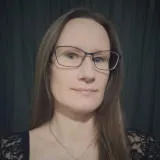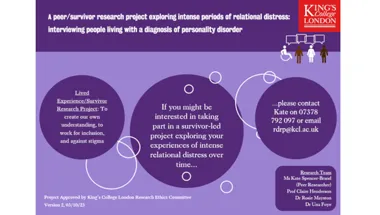
Biography
I am a current PhD Student in the Department of Health Service and Population Research at the Institute of Psychiatry, Psychology & Neuroscience at King’s College London.
I have ongoing lived experience of mental health-related distress, which has shaped my interests and education throughout my life. I’ve studied philosophy, psychology, and mental health research, and I’m currently using a studentship award to work on my Relational Distress Research Project, in which I am positioned as a ‘peer/survivor’ researcher.
Now a mature student, I am still holding on to what has motivated me to fight to continue within education, despite many difficulties: to come to better understand distress, in ways that can be helpful to those of us experiencing it.
I am supported in this by many, including my supervisors, Professor Claire Henderson, Dr Rosie Mayston, and Dr Una Foye.
Research Interests
My project is centred on what I am for the moment calling ‘relational distress’, the psychiatric term/diagnosis for which is ‘personality disorder’. I will be asking participants for their views on my new term, but it is intended to cover not only distress within personal relationships, but within further ways in which people, as relational beings, have experiences: in connection with their self and their body, with communities they may be a part of or excluded from, with the wider world which we all inhabit together, with things that have happened, or are happening, for the person – including traumas, within hopes or fears of what might happen in the future.
The project involves interviewing people (UK-based adults) who self-identify as having received a personality disorder diagnosis at some point in their lives. They will also self-identify as having recently been through a very difficult time, which could be described as an intense period of distress, or crisis.
Each participant will be invited to be interviewed two times, a few months apart, to help explore how things may change over time. I believe that the distress – and for many, disablement – faced by people who receive this category of diagnosis is real, and that people experiencing it deserve compassion, respect, support. Experiencing relational distress may make it impossible for people to fully express who they might be apart from it, but that does not mean that ‘personality disorder’ is an appropriate way to describe the difficulties they face.
My approach is informed by my personal background and the interests I have developed as a result. This includes a commitment to try to come to an understanding of relational distress that is multidimensional, inclusive of the experiences of people who come from different communities, have different identities, and/or different specific life experiences from my own, even as we also have important points of connection.
I hope that my project is a chance to create and weave together personal accounts of distress into a joint story (every individual participant will remain anonymous), a story in which strength can be found.
Research

Centre for Mental Health Policy and Evaluation
The Centre for Mental Health Policy and Evaluation is a leading international centre carrying out world-class research in the areas of evaluation and implementation of mental health initiatives. The aim of the centre is to positively influence mental health policy and practice.
Research

Centre for Mental Health Policy and Evaluation
The Centre for Mental Health Policy and Evaluation is a leading international centre carrying out world-class research in the areas of evaluation and implementation of mental health initiatives. The aim of the centre is to positively influence mental health policy and practice.

